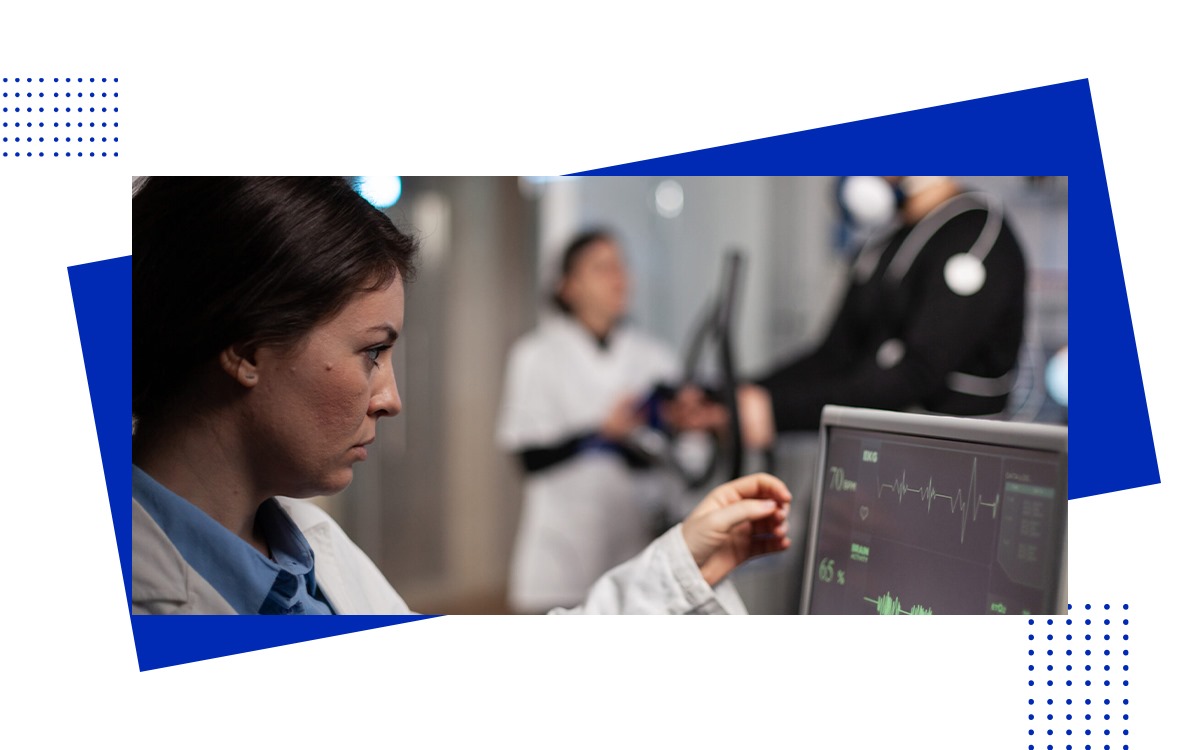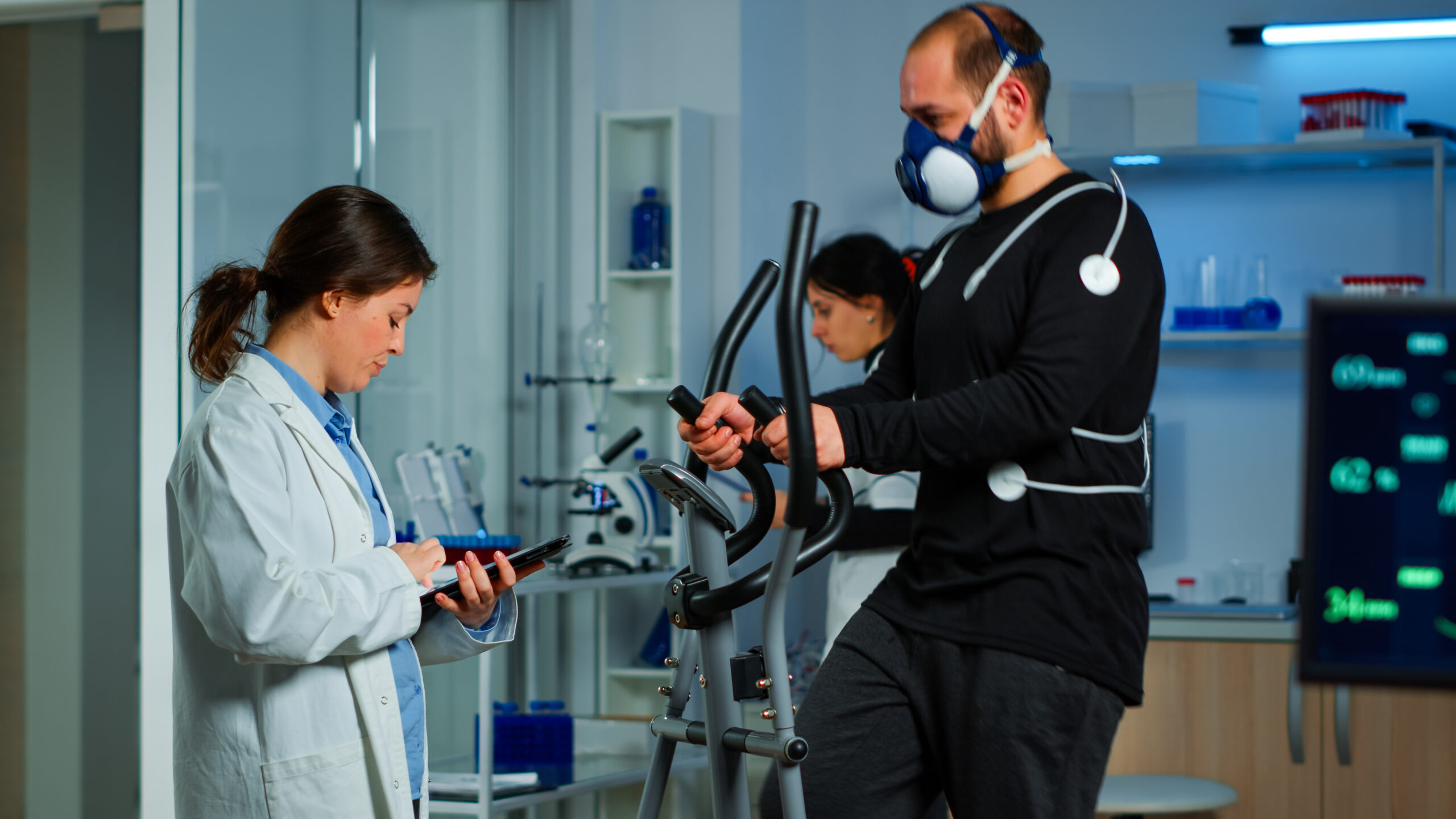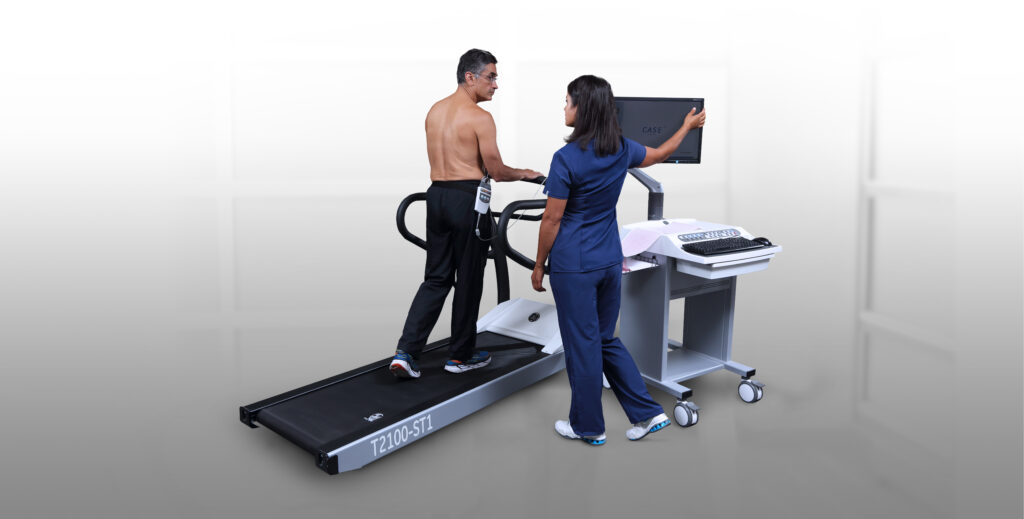
Treadmill Test (TMT)
The treadmill test, also known as the exercise stress test or the stress ECG, is a crucial diagnostic tool in cardiology. This test helps us evaluate the performance of your heart under stress, allowing us to detect and diagnose various cardiac conditions.
What is a Treadmill Test?
The treadmill test is a non-invasive procedure used to assess the heart’s response to physical stress. During this test, the patient walks or runs on a treadmill while their heart rate, blood pressure, and ECG (electrocardiogram) are continuously monitored. The test is typically performed in a controlled clinical environment under the supervision of trained medical professionals.
Why is the Treadmill Test Done?
The primary purpose of the treadmill test is to evaluate the heart’s ability to respond to increased workload and stress. It helps in:
- Detecting coronary artery disease (CAD): By monitoring changes in the ECG during exercise, the test can identify reduced blood flow to the heart muscle, a common indicator of CAD.
- Assessing overall cardiac function: The test provides valuable information about the heart’s pumping capacity and its response to exertion.
- Evaluating exercise tolerance: It helps determine how well an individual can tolerate physical activity, which is essential for creating effective cardiac rehabilitation programs.
- Assessing the effectiveness of cardiac medications: The treadmill test can help doctors gauge the impact of medications on heart function and adjust treatment plans accordingly.
How is the Treadmill Test Conducted?
The treadmill test is conducted in a specialized room equipped with a treadmill and ECG monitoring equipment. Here’s a step-by-step overview of the procedure:
- Preparation: Before the test, a medical professional will explain the procedure and ask about your medical history. You may need to avoid eating or drinking for a few hours before the test.
- Electrode Placement: Small electrodes are attached to your chest, arms, and legs to record your heart’s electrical activity.
- Baseline Measurements: Resting ECG, blood pressure, and heart rate are recorded while you are at rest.
- Exercise Phase: You will start walking or running on the treadmill at a slow pace. The speed and incline of the treadmill will gradually increase to raise your heart rate.
- Monitoring: Throughout the test, your ECG, blood pressure, and heart rate will be continuously monitored. You will also be asked about any symptoms you may experience, such as chest pain, shortness of breath, or fatigue.
- Termination: The test will be stopped when you reach a target heart rate, or if you develop symptoms that warrant stopping the test. Your heart rate and ECG will be monitored during the cool-down period as well.
- Post-Test Evaluation: After the test, you will be monitored for a short period to ensure your heart rate and blood pressure return to normal. The results will be analyzed, and your healthcare provider will discuss them with you.
Interpreting Treadmill Test Results
The interpretation of treadmill test results is based on various factors, including changes in the ECG pattern, your ability to exercise, and the presence of symptoms during the test. Possible outcomes include:
- Normal Result: If there are no significant ECG changes, and you can exercise without symptoms, the test is considered normal, indicating good cardiac health.
- Abnormal Result: Abnormalities in the ECG, exercise intolerance, or symptoms during the test may indicate an underlying cardiac condition that requires further evaluation.
It’s important to note that the treadmill test is just one part of the diagnostic process, and additional tests, such as angiography or echocardiography, may be needed for a comprehensive evaluation.

Benefits of the Treadmill Test at Vikram Mutlispeciality Hospital
When you choose Vikram Multispeciality Hospital for your treadmill test, you can expect a range of benefits that set us apart:
Expertise and Experience
Our cardiology team comprises highly experienced and skilled professionals who are well-versed in conducting treadmill tests. They ensure accurate and reliable results.
State-of-the-Art Equipment
Vikram Multispeciality Hospital is equipped with the latest technology in the field of cardiology, including advanced treadmill machines and ECG monitoring systems. This ensures the highest quality of testing.
Comprehensive Cardiac Care
Our commitment to your cardiac health doesn’t end with the treadmill test. We offer a full spectrum of cardiac services, from diagnosis to treatment and rehabilitation, all under one roof.
Personalized Approach
We understand that each patient is unique, and our approach to cardiac care is tailored to your specific needs. Your comfort and well-being are our top priorities.
Efficient Diagnosis
With our streamlined processes and quick turnaround times, you can expect efficient diagnosis and timely access to the information you need for your cardiac health.
Preparing for Your Treadmill Test
Before undergoing a treadmill test at Vikram Multispeciality Hospital, there are a few steps you can take to prepare:
Follow Instructions
Listen carefully to the instructions provided by our healthcare team. You may be asked to avoid certain foods, beverages, or medications before the test.
Wear Suitable Clothing
Wear comfortable clothing and appropriate footwear for exercise. Avoid tight-fitting clothes that may restrict your movement.
Inform Your Healthcare Provider
Inform your healthcare provider about any medications you are taking, as well as any medical conditions or allergies you have. They need this information to ensure your safety during the test.
Stay Hydrated
Drink plenty of water before the test to stay hydrated. Dehydration can affect the accuracy of the results.

